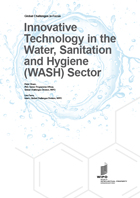New Brief on Water and Sanitation Innovative Technology
May 26, 2020
In May, WIPO GREEN published a Global Challenges Brief Innovative Technology in the Water, Sanitation and Hygiene (WASH) Sector. We asked Dr. Peter Oksen, Senior Programme Officer, WIPO, to introduce the publication.
This edition of the Global Challenges in Focus series explores the water supply aspect of water, sanitation and hygiene and highlights the role of technological innovation in relation to managing limited freshwater resources in situations of scarcity and/or threats to the quality of the water supply.
Why was the topic of water chosen?
The topic of water is paramount: it affects food security, health, economy, the environment, and all other spheres of social functioning. In the beginning of the brief the reader can find statistics demonstrating why ensuring an adequate, stable supply of clean, fresh water is, indeed, essential. However, WIPO GREEN’s expertise lies particularly in innovation and technology, which play a crucial role in sustainable water management. The main focus of the publication is on innovation and technology to improve the water management process throughout its various components, including reserves replenishment, sustainable extraction, transport and distribution, as well as treatment and disposal of wastewater.
What are some of the particular areas that the brief addresses?
The brief addresses a few paths in which innovative water-management technologies have developed, for example: early warning systems, remote sensing and geographical information systems (GIS), satellites, unmanned aerial vehicles (or drones), blockchain technologies, and water loss and sensor-based management systems. The publication specifies advantages and limitations of these solutions and includes real-world, practical examples. Moreover, some developing innovations are included, such as desert water harvesting technologies, for example.
It is important to mention, however, that technology can help provide data and be part of the solution, but social, behavioral and economic factors must also be taken into account.
What are some of the real-world examples you mention in the brief?
There are quite a few examples of real-world solutions in the publication, because we really tried to make it as practical as possible. For example, we explore how satellite images and other earth observation technologies can help better understand the state of water reservoirs and transboundary water management; how blockchain can be used in secure water rights management; how smart sensors can reduce water loss in distribution networks; and how advanced distribution points and adapted payment options can bring safe water to rural communities in developing countries. The brief also contains introductions and explanations of various technological areas.
Moreover, the brief includes several examples from the WIPO GREEN database, a rich resource (over 3,000 technologies available) for anyone searching for climate-friendly solutions. For example, such technologies as a multiple-channel piezoelectric sensor system for online monitoring of water quality, developed by the National University of Singapore, or a virtual prospecting program WaterQuest (India) that can locate high-volume, naturally desalinated, self-recharging and self-replenishing perennial water sources, are presented.
The brief also offers an example of a technology-based, holistic approach to early warning of water-related security threats in West Africa and the Middle East.
Are there any other publications WIPO GREEN is currently working on?
Yes, there are presently two publications in preparation; one on Food Loss and another on Food Waste. The former looks at food lost from production and up to retail, and the latter focuses on food wasted in retail and consumption. Up to one-third of the food produced globally is estimated to be lost or wasted, and this is of course a major global challenge in relation to all three focus areas of WIPO GREEN: climate change, food security, and the environment. In the perspective of sustainably feeding a rapidly growing global population, this subject is of high importance.
About WIPO GREEN
WIPO GREEN is a global marketplace for sustainable technology, supporting global efforts to address climate change. Through its online database and regional activities, WIPO GREEN connects green tech seekers and providers in order to catalyze green innovation and accelerate green tech transfer and diffusion.



